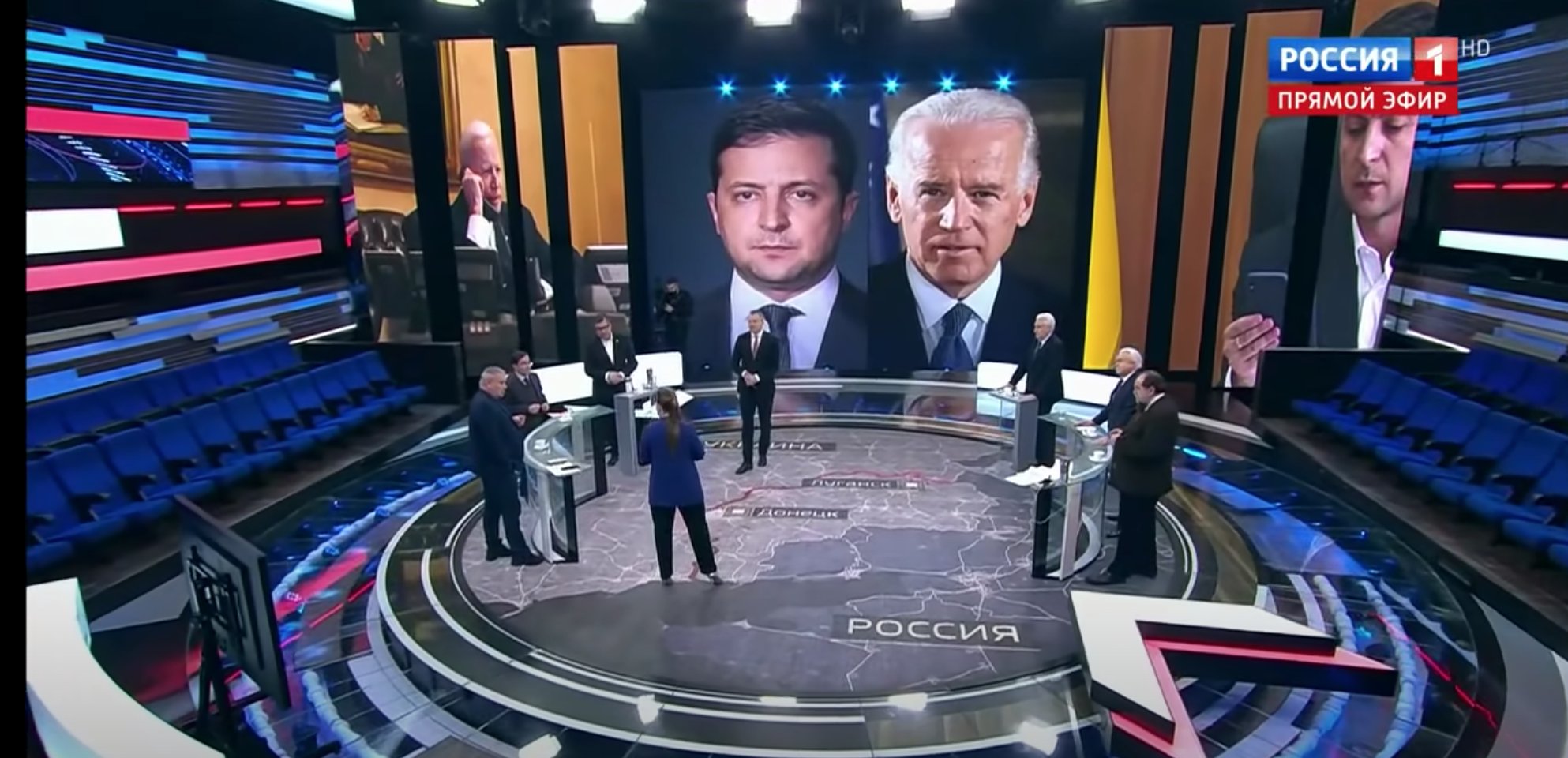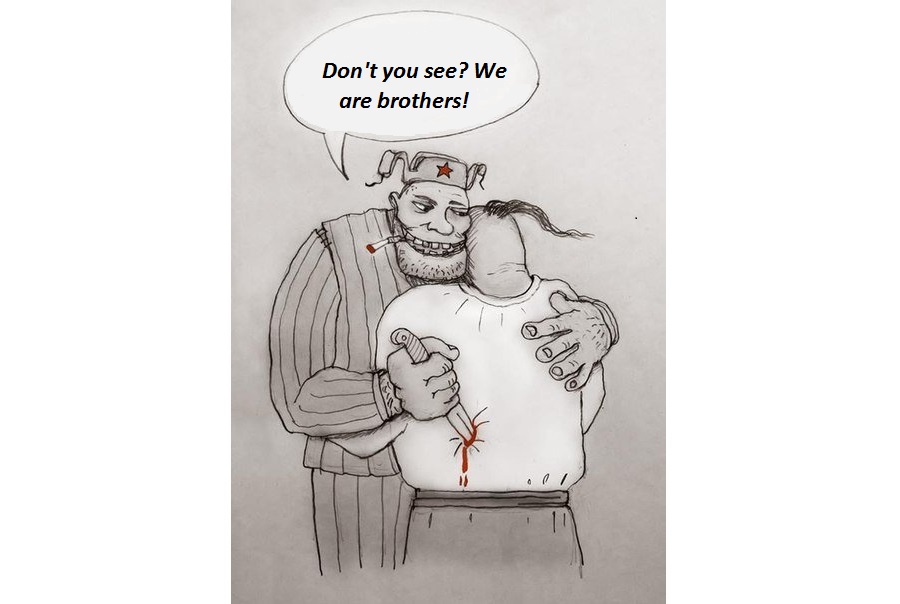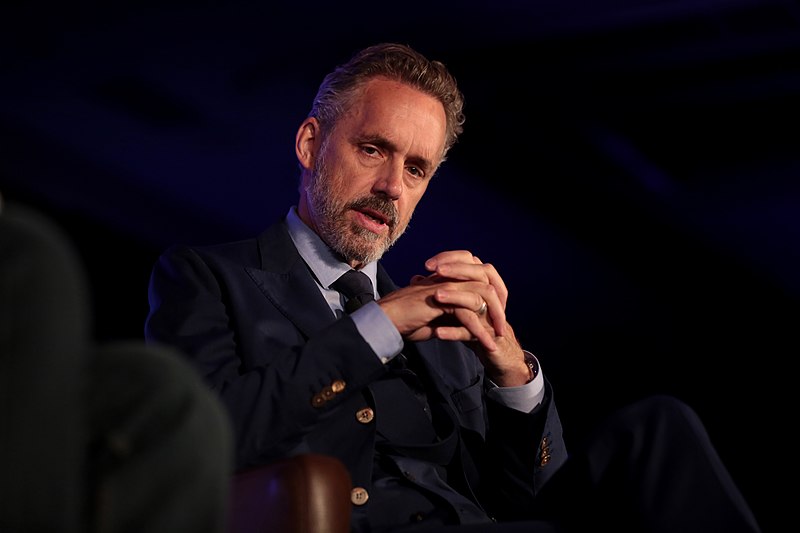There is no data to say for sure whether Russia will attack with its recently amassed 100,000 army around Ukraine. Most likely, those in the Kremlin are still considering various scenarios, evaluating costs and benefits, knowing that the Ukrainian army in 2021 is not that of 2014, and at the very least can inflict heavy losses on Russians. Yet, what one should not underestimate is the Kremlin’s readiness for crazy actions that go in line with its TV narratives.
During a talk show on Russian state TV, Vladimir Zhirinovsky, the most notorious Russian propaganda star and politician, seriously proposed nuclear strikes against Ukrainian military bases. Elsewhere, during an emotional TV show, the TV host Olga Skabeeva dehumanized Ukrainian soldiers, disseminating a fake story about a five-year-old boy allegedly killed by a bomb dropped from a Ukrainian drone.
What is broadcast in the Russian state TV and Russian-owned western media is never just propaganda. Many in the Kremlin as well as among ordinary Russians sincerely believe in provocations planned by NATO as well as an American reign over Ukraine, from which Ukraine should be liberated and protected. Russians do not consider their possible attack against Ukraine as an offensive or occupation but as the liberation of a “brotherly nation” from the “rotten West.”
We have analyzed the latest Russian propaganda messages to better understand not only Russian plans but also the hidden motives of Russian actions which at first glance may look absurd from a Western perspective.

Generally, Russian TV and state-sponsored online media output fit into one single paranoid narrative: [highlight]NATO is advancing too close to Russia, America takes control over Ukraine, the cruel allies plan to attack peaceful Russia and will conduct a new Srebrenica massacre in Donbas.[/highlight]
“We cannot allow NATO rockets to be placed in Ukrainian cities of Dnipro or Kharkiv.” To avoid the imagined hypothetic genocide in Donbas “we should attack first and hit severely, seize half of Ukraine,” claim propagandists to millions of Russians.
Behind these words one may notice despair. “We [the USSR] once were the second economy in the world and now make up only 2%,” complains Russian analyst Sergei Kurginyan. Losing influence over Ukraine to NATO and the EU, Russia finally turns into an ordinary country, equal among others. This new minor role is unacceptable for Moscow. Driven into a dead end, Russia is ready for any deeds to restore the old empire.
Putin’s “Gleiwitz boy” incident: Ukrainian soldiers purportedly killed 5-year-old boy by drone
The most replicated story in recent days is that of a five-year-old boy allegedly killed by the Ukrainian military in Russian-occupied Donbas. If it were not too obviously fake, the story could have become a Gleiwitz incident to justify an offensive.
Nonetheless, the constantly broadcast narrative about Ukrainian provocations and possible attack, albeit without proof, may induce the Kremlin to create new similar stories justifying aggression.
The source of the fake was a statement by the spokesman of the “People’s Militia of the DNR” Eduard Basurin from 3 April. It was rebroadcast by leading Russian news agencies and TV channels. Basurin claimed that the child in the village of Oleksandrivske died from a bomb allegedly dropped by a Ukrainian drone. The child did indeed die according to the OSCE, but no proof for the drone story was presented.
Most probably, the child died from a grenade he may have found – a situation which has unfortunately become all too common in Donbas, where children constantly die from mines and grenades. The fake report was debunked by Stop Fake NGO and later analyzed in detail.
The story is not plausible due to the large distance from Oleksandrivske to Ukrainian positions. Available drones at the time of the incident could not carry the grenade 14 kilometers and remain unnoticed. Moreover, few would believe that Ukrainian soldiers carried a grenade over the heads of several lines of Russian forces close to Ukrainian positions just to kill a boy playing in a backyard 14 kilometers away, unless it was emotionally presented on TV.
The narrative was broadcast during the “60 Minutes in Hot Pursuit” program on 6 April 2021 on the Russia 1 state TV channel. The story was emotionally presented by Russian propagandist and TV host Olga Skabeyeva, on the background of the video of Russian military forces arriving at Ukrainian borders.
“There are 500,000 Russian citizens in Donbas already. And we will protect them,” – claimed Skabeeva, referring to the issue of Russian passports supplied to residents of occupied Donbas.
The Russian desire to protect “its” citizens in Donbas was already predicted by analysts when the massive issue of Russian passports started in Donbas in 2019. Often people received passports just to obtain social benefits and were then used by Russian propaganda.
During the TV program, Skabeyeva did not miss the opportunity to once again remind Russians of the “massive” build-up of Ukrainian military forces near Donbas and the alleged preparation of an offensive by Ukrainians. She however forgot to note that the video demonstrated to support the claim was dated back to 2019 and was a recording of Ukrainian military drills by Defense Express.

Some of the authoritative western media disseminated the Kremlin propaganda. For example, German newspaper Frankfurter Allgemeine reported on the five-year-old killed by a bomb dropped by the drone, citing local separatist media despite the lack of evidence.
Unprecedented wave of disinformation about “Ukrainian and NATO plot against Russia”
Since March, and especially after the fake story about a Ukrainian drone, Russian media intensified its reports on alleged “Ukrainian provocations” in Donbas, along with an imaginary build-up of Ukrainian military forces to attack Russia. That is despite the fact that in August 2020 a new truce was signed in Minsk. Although it was never observed fully, the Ukrainian army followed Zelenskyy’s order to stop preventive fire, responding only in case of targeted shooting from Russian militants.
On 9 April, the head of the so-called Donetsk People’s Republic (DNR) Denis Pushilin said that Kyiv was ready to start full-scale military operations in the southeast of Ukraine. Referring to the imagined threat from Ukraine, the occupiers declared a first wave of military conscription in occupied regions of Donbas.
On 14 April 2021, the Russian Security Council Secretary Nikolai Patrushev said that Ukraine could allegedly organize a provocation to launch hostilities towards Crimea, and could prepare terrorist attacks in Russia and other countries. He even claimed that Ukraine, with the support of Western countries, allegedly created “training centers for sabotage and intelligence groups”, which “may be preparing terrorist attacks in Russia and other countries.” Although such imaginary actions contradict the Ukrainian strategy of peaceful deoccupation and, if implemented, would only harm Ukraine, they perfectly serve the Kremlin goal of making the Russian public feel threatened.
In the best scenario, Putin needs an imaginary enemy to consolidate Russians before the September elections to the Russian parliament. So far, Putin’s party is entering the elections with the lowest support ever. Naturally, massive military training and demonstration of force may serve this very goal. Yet, in a worse scenario, the imaginary enemy, dehumanization of Ukrainian soldiers and stories about killed children are important to make Russians feel ready to fight against Ukraine in a full-scale war.
Weekly press releases by Maria Zakharova, spokeswoman for the Russian Foreign Ministry, are the best examples of this constant building up of an enemy, as Stanislav Zaryn in his article for The Critic puts it:
“Zakharova’s weekly pressers are festivals of aversion, hostility or even hatred towards the countries caught in the Kremlin’s crosshairs. The world is evil, the West is depraved and corrupt, it poses a threat to Russia — such are the main messages spread by Zakharova… The elites of the Kremlin want the Russian public to feel threatened by an imaginary foreign enemy; it helps to consolidate society around the country’s political leadership. It is therefore granted that the harder the situation (of the Kremlin elites), the more blatant and shameless these lies will get.”
Similar messages about a “hostile Kyiv” threatening Russia were voiced by Russian Minister of Foreign Affairs Sergei Lavrov, who expressed Moscow’s “regrets” at Kyiv raising its military potential and urged Berlin and Paris to “immediately bring to the awareness” Ukrainian authorities, as if Ukraine had no right to have its military and defend itself.
In line with Kremlin narrative about the US controlling alleged Ukrainian hostile provocations against Russia, Putin’s spokesman Peskov said:
“Washington can perfectly use its influence over Kyiv (sic) to induce Ukrainians to abandon provocative actions.”
What provocations Peskov has in mind is unclear. The Ukrainian military in Donbas still refrains from preventive fire despite taking casualties. Rather limited Ukrainian military exercises only commenced after 8 April as a response to a Russian buildup along Ukrainian borders.
The Kremlin’s puppets in Donbas also repeat the Kremlin narrative that Ukrainian authorities are allegedly trying to bring the conflict in Donbas to a hot phase and provoke the unrecognized republics to respond militarily.
Finally, the most comprehensive was Konstantin Kosachev, Vice Speaker of the Federal Council, the upper chamber of the Russian parliament. He expressed the Russian version of reality, claiming that by amassing troops along Ukrainian borders Russia is allegedly preventing the conflict and a Ukrainian offensive:
All of Russia’s current actions regarding the southeast of Ukraine are aimed at only one thing – preventing a military operation by Kyiv. This is the focus of the talks between the President of Russia and the partners in the Normandy format, the efforts of the Russian special envoy Dmitriy Kozak… the work of our colleagues in the contact group, and finally, a demonstration of readiness not by words, but by deeds to protect our citizens and compatriots from the use of military force. And this is also the prevention of conflict, not its incitement.
Yet, not by Ukraine alone. The other narrative actively distributed by Russian media is the alleged NATO preparation for an offensive against Russia. Russia Today (RT), the Russian propaganda machine founded by the state, is actively disseminating this narrative to international audiences.
“The real danger is not a Russian invasion, but that the Ukrainian government will misinterpret American signals of support as a green light for an assault on the rebel republics in Donbas,”
says the RT article, reversing the order of events and claiming that the Russian military build-up is just a response to NATO activity.
“A full-scale Ukrainian war would threaten Russian security, the Kremlin warns, pledging action to prevent a ‘humanitarian catastrophe’,”
says one of the headlines, portraying Moscow as a regional peacekeeper, despite the fact it has occupied Transnistria, Abkhazia, Osetia, Donbas, and Crimea. Yet to have an effect on a Western audience, RT uses such words as Ukrainian nationalists and genocide, sensitive for the West.
Ukrainian nationalists are about to conduct “a Srebrenica massacre” in Donbas, claims RT. The agency quotes the Russian president’s Deputy Chief of Staff Dmitry Kozak as saying:
“If there [in Donbas] is, as the president says, a Srebrenica, we will be forced to stand up for ourselves.”
Kozak also refers to Putin’s comment in 2019 that he fears a genocide in Donetsk and Luhansk, if Kyiv regains control over Donbas. Thus Russian propaganda manages to create genocides “in advance.” Although clearly imagined fears, they work as real reasons for real military activity.
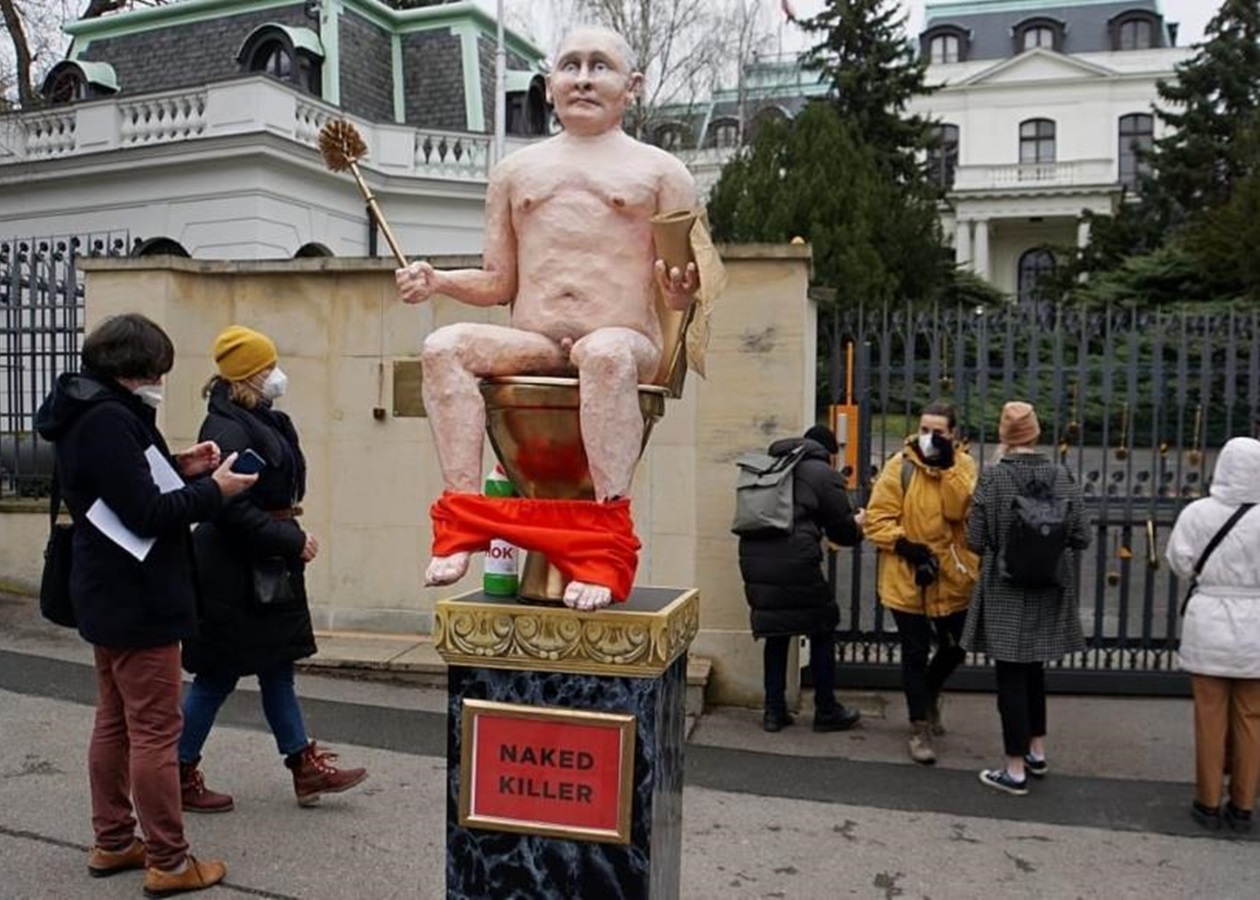
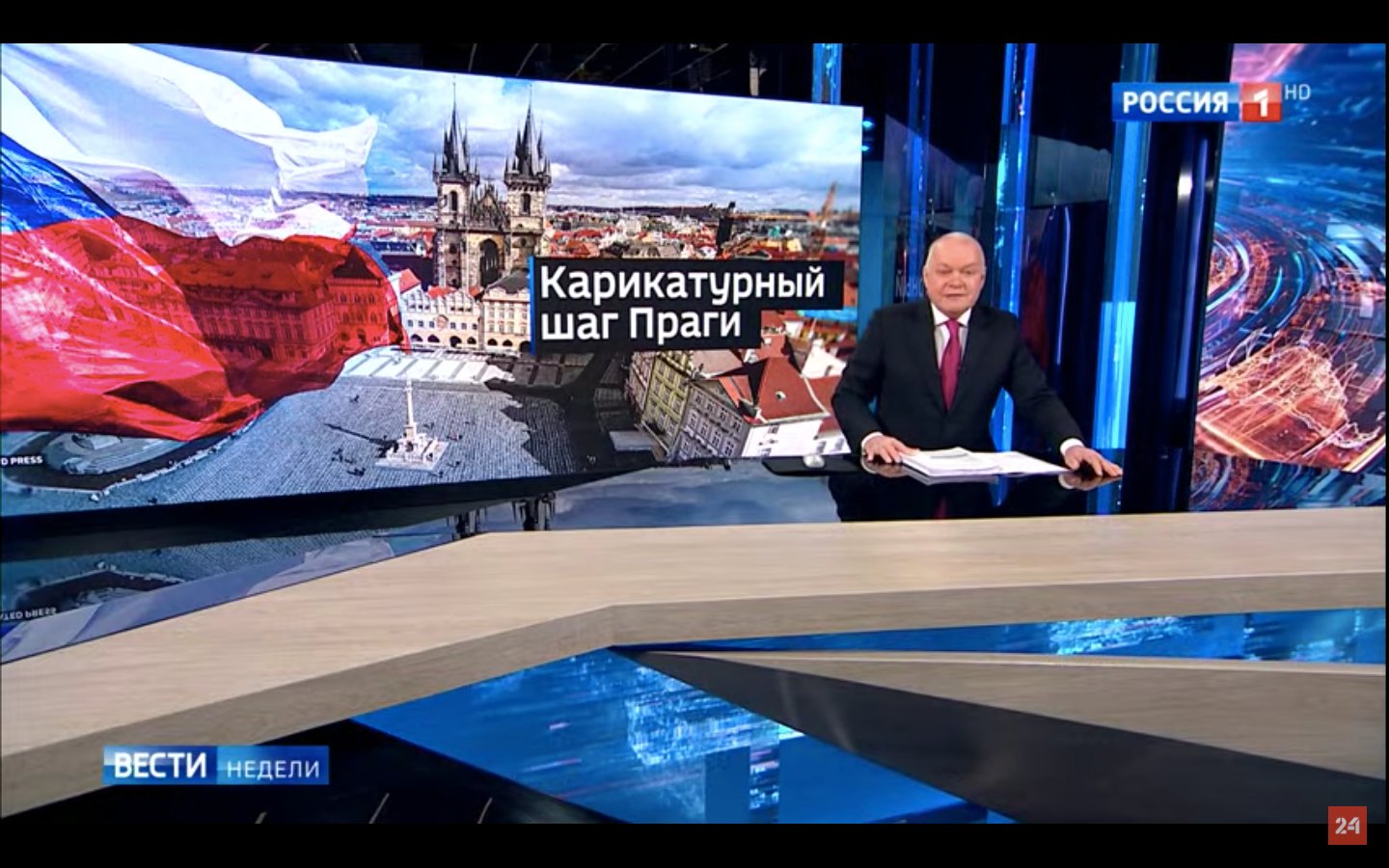
“Will the West back Ukraine if Kyiv starts a war?” asks a RT journalist, making Ukraine an aggressor, and a speaker from London whitewashes Russia
During the cross-talking for the English-speaking RT audience, titled “The end of Ukraine?” the journalist boldly summarizes the situation:
“Will the West back Ukraine if Kyiv starts war?.. The rhetoric of Kyiv is quite harsh, Moscow is reacting. Who is driving it? Is it Kyiv, is it Washington, is it a combination of both?”
Having nothing to accuse Ukraine of, the Kremlin journalist refers to “rhetoric” which in fact became more appeasing after Zelenskyy’s elections in 2019. The journalist refers to Zelenskyy’s presidential directive number 117/2021, loudly labeling it as “fighting words.” Although the directive is about the de-occupation of Crimea, it rejects a military scenario for a strategy of peaceful deoccupation.
Mary Dejevsky, a columnist from London writing for the Guardian and Independent, emotionally answers to journalist’s question:
“I couldn’t take this seriously that Russia would actually want to wage military action that would result in any sort of military confrontation in eastern Ukraine or anywhere in Europe. It’s just seen completely crazy to me.”
She claims that the international audience has a biased understanding of events – many reports about Moscow’s military build-up, and no reports about what is going on in NATO and Kyiv. It is hard to refer to such answers and arguments frostily, considering that Russia already waged military actions against Moldova, Georgia, and Ukraine in 1991, 2008, and 2014. It is not surprising that it continues its aggressive policy today by amassing more troops on the border just at the time when Zelenskyy tried to maintain a truce on Donbas.

“Sunday Evening with Vladimir Solovyev” — the heavy artillery of Russia’s domestic propaganda
“Two hours per day of pure fascism” – thus summarized Ukrainian journalist Yevhen Fedchenko the Russian TV show with Solovyev in his tweet:
Every evening #Russian propagandist Solovyov who lives in Italy fuels hatred & animosity against #Ukraine, #EU, #US. Leitmotif – superiority of Russia as civilisation, quasi-religious Russian nationalism, decadence of the West, mobilisation for war. 2 hours/ day of pure fascism pic.twitter.com/FiSVHyAnfP
— Yevhen Fedchenko (@yevhenfedchenko) April 6, 2021
Indeed, Solovyev’s evening programs are the concentration of Russian domestic propaganda and probably the best ever weathercock to detect the direction of Kremlin winds. The most comprehensive Sunday show broadcast on 11 April 2021 summarized the Russian version of reality which justifies and explains the military buildup.

Among others, the program hosted Margarita Simonyan, the chief director of Russia Today, Vladimir Zhirinovsky, leader of the Russian Liberal Democratic party that, despite its name, promotes radical military policies, and Sergei Kurginyan, leader of the Russian movement Essence of Time advocating the restoration of the USSR.
Speakers considered the military build-up within the global context — the rivalry between NATO countries on the one side and Russia, China, and their allies on the other. At the same time, speakers noted that “1991 was our last defeat,” thus stating not only nostalgia for the USSR, but also claiming that the USSR was essentially a Russian imperial project that should be restored. The ultimate goal is to make Russia a meaningful leader in world politics again. Speakers regret that currently, Russia is losing its influence as in Ukraine. It seems they sincerely perceive this with pain and openly confirm that the current situation is “the dead-end” — only radical actions can move Russia away from decay.
“The war is inevitable – we can’t reach any compromise, we can’t allow that we become another nation,”
says Margarita Simonyan referring to Russian history and claiming that it is Russian history that constitutes the Russian nation. Russians cannot forget their history and take another path. These words uttered by Simonyan are probably the most precise explanation of why Russia is waging its current proxy war against Ukraine and further distancing itself from the West. Russian history has always been about the dominating empire — an equal role among other nations contradicts this history, making Russia “another nation.” Perhaps the democratic minority in Russia desires just this “other nation”, but this is unacceptable to the current political elite who are mostly over 60 and still carry a Soviet mentality.
“We should take Donbas and protect it from Srebrenica, or our own people won’t understand us,”

Simonyan continues her narrative, again referring to an invented hypothetical genocide which allegedly may happen if Ukrainians regain occupied Donbas.
“If we do not cut Ukraine in half, the nuclear weapons of NATO will be located in Kharkiv and Dnipropetrovsk,”
continues Zhirinovskiy, directly stating that such a scenario is “unacceptable for us.”
“We cannot allow missile systems in Kharkiv or Dnipro. We lose the battle”
NATO in Ukraine would be the end of Russia. NATO troops in Ukraine would mean the end of any even imagined Russian domination in the region. This is the source of all hysteria in the media regarding Ukraine and NATO as well as the recent military build-up. It looks like the last desperate jerk of the failing empire, although still dangerous.
The bottom line
Read also:
- Russia’s triple strategy of proxy war used against Georgia in 1920 and now
- Four Ukrainian soldiers killed in Donbas as Russia continues troop buildup and escalates propaganda
- Moscow moving 15 warships from Caspian Sea to waters off Ukraine
- Russia violating international law by closing Kerch Straits to naval vessels until October, Kyiv says
- Advisor to Russian Defense Minister warns of ‘mental war’: who is waging it and against whom?
- Seizing Ukrainian water for Russian-occupied Crimea #1 task for Putin, Illarionov says
- Russian buildup, MH17 tapes, and plans for a Ukrainian Silicon Valley | Weekly news roundup
- “Poke-and-probe.” Why Russia is massing troops & military hardware along Ukraine border




